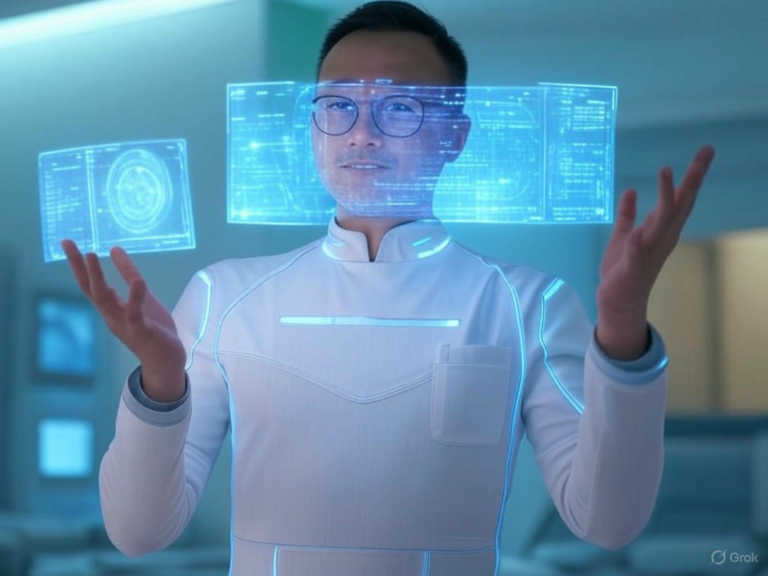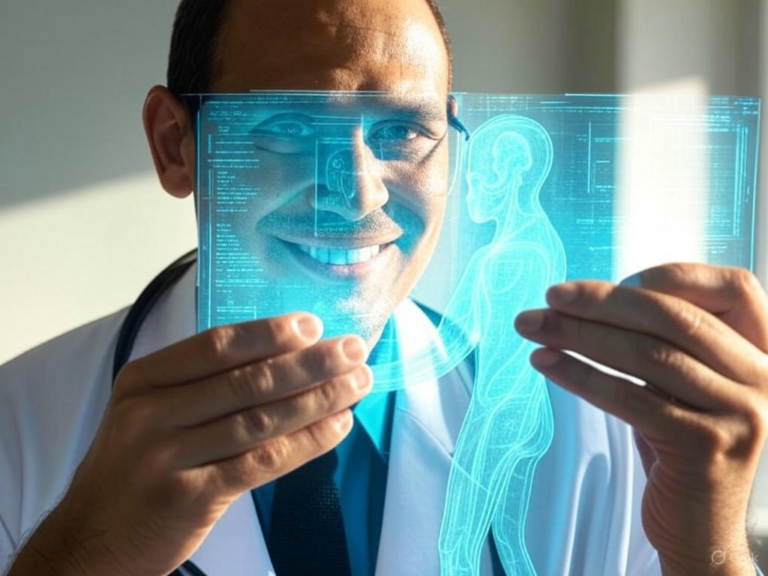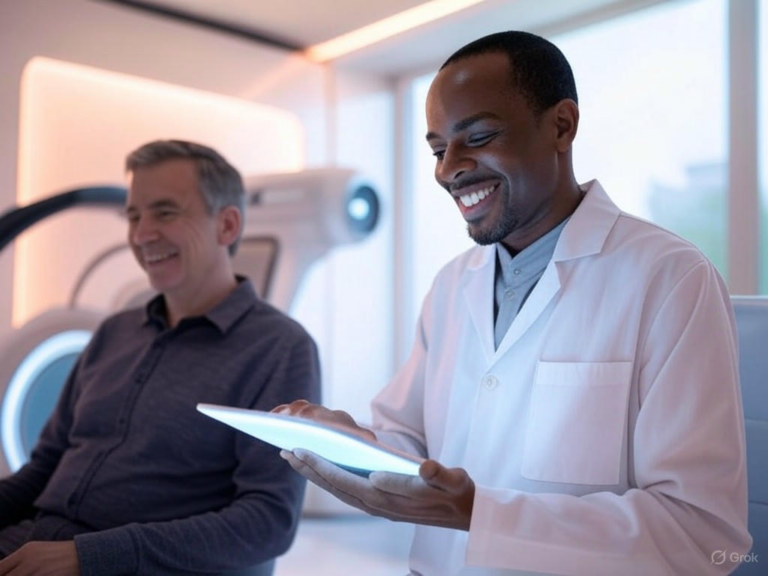
AI Transforming Medicine: 4 Key Innovations Poised to Revolutionize Healthcare
Introduction: The AI Healthcare Revolution
AI in healthcare is fundamentally transforming how we approach medicine, offering tools that enhance diagnosis, treatment, and patient care in ways we couldn’t imagine just a few years ago. As we move through 2025, this technology has shifted from experimental to essential, impacting everything from drug discovery to remote consultations and ongoing health monitoring. Have you ever wondered how AI could catch a disease before symptoms even appear?
It’s not just about tech for tech’s sake—AI in healthcare helps achieve better outcomes by making care more accessible, standardized, and personalized, all while potentially saving billions, like the projected $360 billion in the U.S. alone. In this exploration, we’ll dive into four key innovations that show how AI is set to change the game, blending current uses with exciting future potential.
AI in Healthcare: Early Disease Detection
One of the most exciting aspects of AI in healthcare is its power to spot diseases early, often before traditional methods can, which could save lives through quicker action. This capability turns reactive healthcare into something proactive, giving patients a real head start on recovery.
Advanced Diagnostic Imaging
AI systems are now analyzing medical images with incredible accuracy, picking up on details that even experts might miss. For instance, at UC San Francisco’s Center for Intelligent Imaging, researchers created an AI program that flags potential pneumothoraces—collapsed lungs—affecting thousands annually and requiring immediate attention.
By training on a vast database of chest X-rays, this AI tool learned to spot subtle signs that could be overlooked, earning FDA approval in 2019 and integration into GE Healthcare machines worldwide. As Dr. John Mongan noted, it’s like an extra set of eyes that speeds up diagnoses and improves care right at the bedside—what could be more reassuring for patients facing uncertainty?
Predictive Health Monitoring in AI-Driven Care
Beyond images, AI in healthcare is advancing predictive monitoring, where algorithms detect issues before symptoms show up, marking a shift toward prevention. In 2025, companies like Bloomer Tech are innovating with smart clothing, such as bras that track vital signs and combine them with lifestyle data for deeper insights.
This approach is especially helpful for conditions affecting women, like certain heart issues, by providing continuous, non-invasive monitoring. Imagine wearing your favorite outfit while it quietly works to keep you healthier—it’s a simple yet powerful way AI is making everyday life safer.
Precision Medicine and AI in Healthcare Integration
Another breakthrough is how AI in healthcare enables precision medicine, tailoring treatments to individual needs rather than a generic approach, which can lead to more effective outcomes and fewer side effects. This personalization is like custom-fitting a suit instead of buying off the rack—it just works better for everyone involved.
Multi-Modal Data Analysis
AI excels at combining different data types, like genetics and clinical records, into what experts call “holomics,” creating highly personalized treatment plans. This means diseases aren’t treated as one-size-fits-all anymore; instead, AI identifies specific subtypes for targeted therapies.
For example, by integrating genomic and proteomic data, AI can suggest interventions that minimize risks and maximize results—have you thought about how this could change chronic disease management? It’s a game-changer, making healthcare feel more human and responsive.
Timeline of Precision Medicine Evolution
Let’s break down how precision medicine is unfolding with AI’s help through a simple timeline.
| Timeline | Connected/Augmented Care | Precision Diagnostics | Precision Therapeutics |
|---|---|---|---|
| Short term (0-5 years) | Internet of things in healthcare, Virtual assistants, Augmented telehealth | Precision imaging (e.g., diabetic retinopathy) | Increasing use of CRISPR technology |
| Medium term (5-10 years) | Ambient intelligence in healthcare | Large-scale adoption of precision imaging | Synthetic biology, Immunomics |
| Long term (>10 years) | Autonomous health assistants, Networked care organizations | Holographic imaging, Integrated holomics | Genomics medicine, AI-driven drug discovery |
As this timeline shows, AI in healthcare is automating tasks in the short term and paving the way for advanced therapies later, ultimately leading to truly individualized medicine. If you’re in healthcare, consider how adopting these tools early could benefit your practice—it’s about staying ahead of the curve.
Automated Systems in AI for Healthcare
AI in healthcare is also streamlining operations through automation, handling everything from routine admin to complex decision support, freeing up professionals to focus on what matters most: patients. This efficiency isn’t just convenient; it’s transformative, reducing errors and improving overall system performance.
Clinical Decision Support
Tools like Google’s DeepMind Health use AI to analyze data patterns and flag risks, helping clinicians make informed choices based on a patient’s full picture, including genetics and environment. This support means better coordination of care and improved long-term treatment adherence—think of it as a reliable co-pilot for doctors.
For instance, in a hypothetical scenario, AI could alert a team to a patient’s deterioration days in advance, potentially preventing emergencies. If you’re a healthcare provider, exploring these systems might be the key to more proactive patient management.
Smart Hospital Management
AI is optimizing hospital workflows by predicting patient needs and automating tasks, which cuts down on waste and boosts efficiency during crises like mass events. Connected emergency systems, for example, can route patients quickly and allocate resources smartly, saving critical time.
A study from PwC highlights how this automation enhances outcomes by focusing staff on high-impact care—you can read more here. What if your local hospital adopted this? It could make a real difference in community health.
Telehealth and AI in Healthcare Revolution
The rise of telehealth, boosted by AI, is making remote care more effective and accessible, especially since 2020, and it’s evolving rapidly in 2025. This innovation ensures that quality healthcare reaches people regardless of location, blending convenience with advanced technology.
AI-Enhanced Virtual Consultations
AI takes telehealth further by powering virtual assistants that assess patients initially, analyzing cues like speech or expressions to prepare doctors. In the short term, this means augmented consultations and mental health support, with future advancements like ambient monitoring on the horizon.
Could this be the future of routine check-ups? It’s already helping, as seen in personalized AI interactions that make consultations feel more thorough and less impersonal.
Remote Monitoring Systems
AI-driven remote tools provide ongoing monitoring from home, using algorithms to catch changes early, which is crucial for chronic conditions. The FDA’s approval of 91 AI devices in 2022, including features in wearables like the Apple Watch, shows how this is becoming mainstream.
These systems allow doctors to prioritize urgent cases, improving outcomes through timely interventions. For patients, it’s empowering—staying connected to care without constant visits can ease daily life.
Future Outlook: AI’s Evolving Role in Healthcare
Looking ahead, AI in healthcare will refine current tools and introduce new ones, like robotic therapies in the next five to ten years, driven by rich data sets. This evolution promises to place AI at the core of medical decisions, making healthcare even more efficient.
Beyond that, concepts like digital twins could simulate treatments personalized to each patient, leading to breakthroughs in curative care. How might this shape your health journey in the coming decades—it’s an exciting prospect worth watching.
One tip: Stay informed on these developments to make smarter health choices today.
Conclusion: Embracing AI’s Potential in Healthcare
The innovations we’ve covered—early detection, precision medicine, automation, and telehealth—demonstrate how AI in healthcare is just getting started, with benefits like better access and cost savings on the horizon. Yet, success depends on ethical use, data security, and keeping the human touch at the center.
As you reflect on this, consider sharing your thoughts: How do you see AI changing your healthcare experience? We’d love to hear in the comments, and feel free to explore more on our site or share this article with others curious about the future of medicine.
References
1. A study from PMC found key insights on AI’s role in medicine. [PMC Article] (https://pmc.ncbi.nlm.nih.gov/articles/PMC8285156/)
2. Harvard Gazette discusses AI’s transformation in healthcare. [Harvard Gazette] (https://news.harvard.edu/gazette/story/2025/03/how-ai-is-transforming-medicine-healthcare/)
3. World Economic Forum explores global health impacts. [WEF] (https://www.weforum.org/stories/2025/03/ai-transforming-global-health/)
4. World Health Expo highlights top innovations. [World Health Expo] (https://www.worldhealthexpo.com/insights/ai-automation/top-5-ai-driven-medical-innovations-in-the-united-states)
5. UCSF news on AI in medicine. [UCSF] (https://www.ucsf.edu/news/2024/12/429031/4-ways-artificial-intelligence-poised-transform-medicine)
6. Impact My Biz blog on smart technology. [Impact My Biz] (https://www.impactmybiz.com/blog/smart-technology-in-healthcare/)
7. PwC report on AI and robotics. [PwC] (https://www.pwc.com/gx/en/industries/healthcare/publications/ai-robotics-new-health/transforming-healthcare.html)
AI in healthcare, medical innovations, precision medicine, artificial intelligence in healthcare, healthcare technology, AI-driven diagnostics, early disease detection, automated healthcare systems, telehealth advancements, future medical innovations







